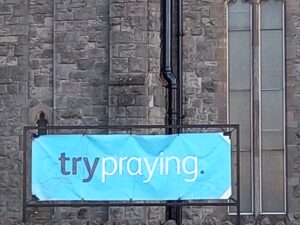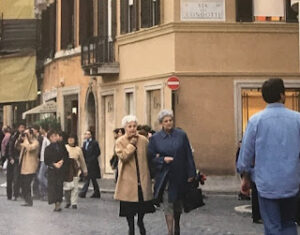 Prayer in the charism of the Focolare Movement by Fr. Fabio Ciardi
Prayer in the charism of the Focolare Movement by Fr. Fabio Ciardi
All Christians pray, it is what Jesus taught, it is the prayer of the Church. Yet as Christian spirituality is manifested in many ways, so too prayer can have different expressions, inspired by the charisms that animate them. What, then, is prayer in charism of the Focolare Movement? It is difficul t to describe it, but with the help of four photos I tried.
First photo: deep in relationship with God
I took this photo on 23rd November, 2003, at the beginning of a meeting of the Abba School (Study group of the Focolare) while Chiara, in silence, was asking Jesus to renew the pact of unity among us. It is slightly blurred but it is particularly dear to me because it shows her absorbed in God, her hands joined, her eyes closed, an icon of a deep and intense recollection.
I saw her pray in a simple and spontaneous way, when she prayed with us during a visit to Jesus in the Tabernacle or when she recited the rosary and during a visit to a shrine. Although it was her “secret”, sometimes she brought us into the intimacy of her prayer.
We could follow the path of Chiara’s life in search of many moments of prayer. We would see her enter a church, go to the quietness of her study or to the chapel in her house, stopping to contemplate nature or lost in the crowd where she always found God…
 The moment of prayer was “the most beautiful moment” for her, “the best moment” of the day. During a trip to Argentina, on 23rd April 1964, she wrote in her diary:
The moment of prayer was “the most beautiful moment” for her, “the best moment” of the day. During a trip to Argentina, on 23rd April 1964, she wrote in her diary:
“Today is undoubtedly the best day, or rather, this is the best moment of the whole journey: I am writing in the focolare, in front of You, Jesus-Eucharist, in the little chapel.”
Thinking about the previous days spent in New York and the city’s skyscrapers, she continued:
“Here, we are not on who knows which floor of a skyscraper (…), not only in the seventh Heaven, but in heaven itself. And in this house, I/we/ “feel” your presence, Jesus, which is so strong that all other presences disappear.”
Chiara has left us many written prayers. They are an expression of a sincere personal relationship with God, animated by the desire to live her entire life in love for Him:
“Yes, Jesus, I know that in life, in every moment of life, all that matters is to love You. At the end of my life (which may be sooner or later) I would like to be able to say to you: “I have always loved you”. I don’t know what to say to You, Lord; I try to read, to meditate, but I must stop to be with You: I need You, Lord, because everything else I do (…) seems empty to me. I need to review my life with You, to make my calculations with You, to be with You, but not inactive, but with You. To make sense of later on when I will go out.” (Diary, 19 May 1966)
Chiara’s relationship with God did not consist of talking much, but of loving much, it went far beyond prayers:
“Jesus, when you come into our hearts, it would be time to ask you many things. But precisely because You in person come into our hearts, it is the time when we have nothing more to ask of you.” (Thoughts, p. 14)
“And so meditation becomes like a perfume that spreads fragrance throughout the day: It has become a real dialogue, not a monologue. I feel listened to and my whole soul falls in love. It’s like opening a bottle of perfume that spreads its fragrance throughout the day, because I try to do meditation in the morning.” (26th June 1978, Diary)
A biography of Chiara could be written from the point of view of her loving relationship with her Spouse, Chiara and prayer. It would allow us to enter more into her secret conversation with God, as in this well-known page from her diary:
“The Trinity within me! The abyss within me! The immensity within of me!
The abyss of love within me! The Father that Jesus has announced to us within me!
The Word! The Holy Spirit, whom I always want to have to serve the Movement, within me!
I cannot ask for anything better. I want to live in this abyss, to lose myself in this sun, to live with Eternal Life.” (22nd May, 1972)
Recently someone said to me: “Why is there a fear of solitude in the spirituality of unity? For me, solitude and silence are simply an incredible need for God… I feel it as a call to Him alone.” I would like show this person these photos or share this simple phrase from Chiara’s diary of 27th September, 1965: “What does this: “I must convert myself” mean? This “living within”, this “living in the Trinitarian life as a prelude to the life to come”? It can only mean desiring, my God, to put you first every minute so that charity in us is as it should be”
Second photo: Praying in the city
 This photo was taken much later, in Via Condotti, in the centre of Rome. Chiara did not live in a convent; she lived her prayer in the daily life of the city. In 1950, she wrote the “Resurrection of Rome”:
This photo was taken much later, in Via Condotti, in the centre of Rome. Chiara did not live in a convent; she lived her prayer in the daily life of the city. In 1950, she wrote the “Resurrection of Rome”:
‘I pass through Rome and I do not want to look at it.
I look at the world within me and I cling to all that has being and value.
I become completely one with the Trinity that lives in my soul, allowing myself to be enlightened by its eternal Light and filled with its heaven.
I live in that heaven populated by the angels and saints who, not being constrained by the limits of time and space, can all convene in a unity of love with the Three in my humble being.”
Did Chiara opt out of/ the city, and its secularism? She didn’t. That ‘do not want to look’ is only the first moment, almost like a run up so as to launch oneself back into the world, but with a new way of looking, the one that comes from an intimate and personal relationship with Jesus, from deep prayer:
“I look at the world and everything in it.
But it is no longer I; it is Christ in me who looks at the world and desires to make the blind see, the mute speak, and the crippled walk. (…)
Therefore, opening my eyes once again to the world outside, I see humanity with the eyes of God who believes all things because he is Love. (October 1949, Paradise ’49)
Chiara could find God everywhere because her prayer brought her into a constant relationship with God; it was not confined to times dedicated explicitly to prayer. Her whole life slowly became prayer. Even 15 years later, on 4th April 1965, while still based in Rome (she was living in Via Valnerina), she wrote:
“Someone is calling me powerfully in the depths of my soul to unite myself to him.
It is You, my God, and when I think if you, even in the middle of Via Veneto, or Corso d’Italia, everywhere, my soul is deeply moved.
And there is an oasis in it, which attracts me as the only realm of peace, of love… but which is so different, so unlike the rest! You call me, you call me, you attract me, you want me!
How true it is that You are the only One for my soul, when my soul is in this disposition! And how true it is that with You, my sins, and imperfections, those unnecessary words seem so big.
Forgive me, my God!
I longed for this union, for its aim is not our unity with just anyone, even with the Holy Father, but only to increase union with you.
And I ask you for the greatest glory and holiness for him.”
Chiara did not seek external recollection, she did not fear ‘the external din of the radio turned on at full blast by the tenant next door, or the roar of the traffic, or the yelling of the newspaper boys.’ She was not even attracted by the way of life in the cloister, which she greatly esteemed and admired, convinced that “even my own home can have the perfume of the cloister; also, the walls where I live can become a kingdom of peace”. She perceived Her prayer and her interior recollection as the fruit of God’s action, God, who wanted to take possession of her whole person, “move my actions, permeate my thoughts with his light, rouse up my will, give me, in short, the law of my stillness and of my movement.”
She affirmed that God:
“(…) will know how to give these walls the importance of an abbey, and this room the sacredness of a church, my sitting at table the sweetness of liturgy, my clothes the perfume of a blessed habit, the sound of the doorbell or the telephone the joyous note of a meeting with my brothers and sisters, which interrupts, yet continues, my conversation with God.”
And finally, ‘Christ will be my cloister, the Christ of my heart, Christ in the midst of our hearts.’
(Meditations, Italian version 2020, p. 82).
To be continued with photos 3 & 4
Fr. Fabio Ciardi
https://fabiociardi.blogspot.com/2023/08/la-preghiera-nellesperienza-di-chiara.html

